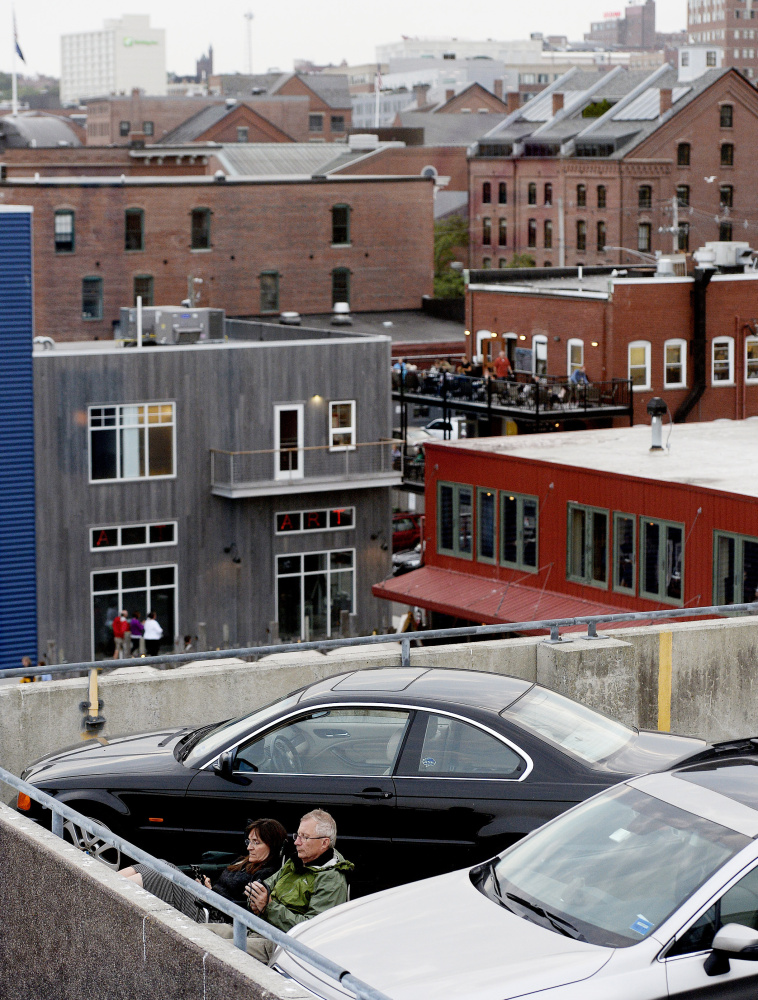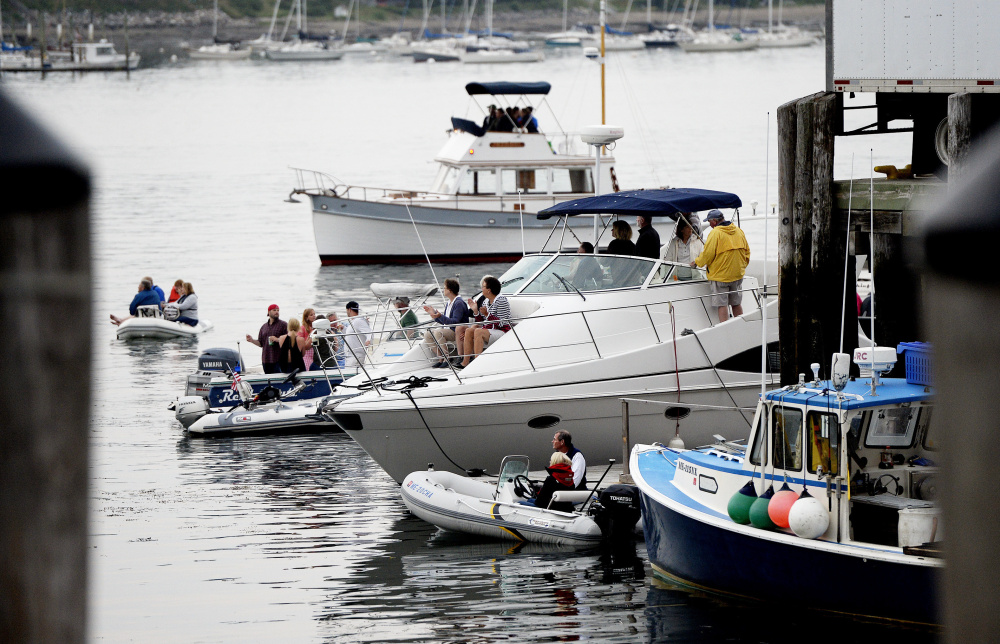Music from concerts on the Maine State Pier often permeates the densely packed neighborhood on Munjoy Hill. Occasionally, it reaches homes around Back Cove, and beyond.
But, whether that noise is a nuisance or treat depends on the listener.
“We can definitely hear them from the deck, but they’re not super loud. If we go inside, we can’t hear it,” said 31-year-old Lindsay Rowe, who lives on St. Lawrence Street about a half-mile away and often invites friends over to enjoy the music on her deck. “It kind of seems like we have a CD playing low.”
But for other residents in Rowe’s neighborhood, like 65-year-old Paula Agopian, who lives on Monument Street, the music amounts to noise pollution.
“I think it’s gotten out of control. I don’t think it needs to be so gosh-darned loud,” Agopian said. “The city has got to do something.”
Concerns about noise increased this month during a particularly busy period on the pier, when there were nine concerts over 10 days. The last concert in that stretch was Friday – a sold-out Bonnie Raitt show. The next concert will be Aug. 28, when Blues Traveler, The Wallflowers and G. Love & Special Sauce take the stage.
Those who are fed up with the music have been heard by the neighborhood’s city councilor.
Councilor Belinda Ray said she has received regular complaints from about 15 different people, but she suspects there are many more who are concerned and choose not to complain, or don’t know the process.
Ray said Tuesday’s concert, featuring the Irish-rock band Flogging Molly, seemed to be particularly loud to constituents, with one Sheridan Street resident saying, “In all due respect, who in their right mind thinks that this is even considered music? It’s just screaming!”
Ray hopes to sit down with the concert promoter at the end of the season to discuss her concerns.
“Yes, I think it’s too loud considering the frequency of the concerts,” Ray said in an email. “We’re talking about a level of noise that is disruptive for people within a certain radius of the pier 2-3 times a week all summer. That’s too much.”
AIMING THE SOUND
Waterfront Concerts has been using the Maine State Pier for concerts since 2014, when it began by putting on a handful of shows. Last year, the promoter, which also puts on concerts on the Bangor waterfront, brought 27 shows to the Portland pier. This year, 28 shows have taken place or are planned.
In 2015, more than 50,000 attended concerts in Portland, and the city netted nearly $100,000 in revenue through the concerts from fees paid to use the pier. Local businesses, especially the restaurants and bars, also benefit.
“The Waterfront Concerts at the Maine State Pier are a great boost for local businesses, as many attendees arrive before the concert to shop and dine,” said Casey Gilbert, executive director of Portland Downtown, a trade group for local businesses. Some people stay overnight and spend a day or two in the city, Gilbert said.
Last year, more than 36 formal noise complaints were filed with police, through its nonemergency dispatch office. Thirteen of those complaints came during the Rusted Root and the Wailers show, which happened on the same day the city publicized the fact that, when complaints are received, police on site work with event staff to take decibel readings and, if necessary, turn down the music.
So far this season, the number of formal complaints is down from last year. Through 22 shows, only 14 formal complaints have been filed with police, while additional complaints have been lodged through the city’s website.
Alex Gray, founder of Waterfront Concerts, attributes the drop in complaints to a new, $750,000 sound system that allows engineers to focus the music on the crowds and reduce the low bass tones, which tend to travel farther and generate noise complaints.
“That has helped curtail the number of issues we have had,” Gray said. “We’ve spent an enormous amount of time understanding our impact on the community.”
Andy Downs, the city’s director of public assembly facilities, which oversees the pier use, complimented Gray for making noise issues a “top priority.”
“Waterfront Concerts have been extremely responsive to noise concerns,” Downs said. “They have also done a great job assisting city staff in communicating our policies and needed adjustments to the touring sound engineers.”
VOLUME UNCHANGED
According to a Press Herald analysis of decibel readings taken by the city, the sound levels in 2015 and 2016 have been about the same. In 2015, the average reading at the entrance to the concert venue was 84.2 decibels, while this year the average is 83.7 decibels. By comparison, a normal conversation is 60 to 70 decibels, a garbage disposal is 80 decibels and a power lawnmower is about 90 decibels.
The city also takes periodic readings at the intersection of India and Commercial streets, among other locations. At that intersection, the average sound level for 2015 was 63.1 decibels, compared to 62.9 decibels in 2016.
According to city records, a reading of 88 decibels on the pier is loud enough to generate complaints a mile away on North Street and Waterville Street on Munjoy Hill.
The city’s noise ordinance prohibits noise levels from exceeding 92 decibels, averaged over 1 minute. According to that ordinance, that measurement is “measured eight feet (8′) from the means of egress (of an establishment) located nearest to the noise source, or eight feet (8′) from the noise source if it is generated outdoors.”
However, the city’s contract with Waterfront Concerts says volumes “shall be maintained at a reasonable level,” which is not defined.
Weekday concerts are supposed to end before 9 p.m., while weekend concerts must end by 10 p.m., unless the curfew is extended.
The loudest shows don’t seem to generate the most complaints. For example, the July 21 Slightly Stoopid show that generated at least five formal complaints had a reading at the turnstile of 88 decibels. Meanwhile, three other shows with higher readings generated no formal complaints: 311 on June 17 registered 92 decibels; Jackson Browne on June 9 registered 91; and Philip Phillips on Aug. 7 registered 90.
“We take all of the complaints seriously, and understand that varying levels of sound affect people differently,” Downs said.
A COVERED PIER?
Before unanimously approving the 2016 concert season last fall, several city councilors noted the number of complaints they received the previous year.
At the time, city staff mentioned that they had preliminary conversations with Waterfront Concerts about covering the pier to reduce noise pollution and improve the experience for concert-goers.
Gray, the promoter, hopes to sit down with city staff once this year’s concert season ends on Labor Day weekend to explore its options – whether it’s continuing to add amenities to the pier, such as bathrooms, or even to cover it. Adding some sort of sheathing or harder roof on the pier would allow the pier to be used for more functions and conferences, while providing shelter for concert-goers during the rain, in addition to dampening the noise, he said.
“We’ve been advocating to have a visionary meeting with city to discuss what they want to do,” Gray said. “We see an opportunity for more uses on the pier and elongating the season.”
For residents like 72-year-old Sharon Murphy, who lives close to the Maine State Pier at 40 Portland Pier, any steps to reduce the noise would be welcome. She said she can feel the bass vibrations in her condo.
“It’s the bass beat. It’s the ‘boom.’ That’s what’s infiltrating our lives,” Murphy said. “It’s not right. Something has got to be done.”
Send questions/comments to the editors.




